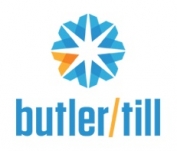



Butler/Till

New York, United States
December 2015
Advertising & market research
Service with Minor Environmental Footprint
United States
Butler/Till empowers brands to reach, engage, and activate their consumers through multi-platform programs and campaigns. The agency builds progressive media and communications programs across digital, social, traditional, and experiential platforms. At Butler/Till, creativity takes on many definitions. As a media and communications agency, Butler/Till’s teams include an operations, data, and analytics group, a dedicated strategy and planning practice, account management, creative and content services, and of course a full-service media department comprised of strategists, planners and buyers. All teams are incentivized to creatively develop solutions to strengthen the agency’s capabilities. Butler/Till prides itself on building a culture that literally rewards creativity with ownership of the agency through our employee stock ownership plan. Eligibility is open to any employee with at least one full-year of service to the agency. At the heart of its commitment to creativity, Butler/Till empowers everyone to fuel agency-wide success and consistently works to show its appreciation for employee-led ideas. This practice is critical for the agency’s long-term growth; as employee owners, everyone is considered a leader.
Overall B Impact Score
Governance 15.8
Governance evaluates a company's overall mission, engagement around its social/environmental impact, ethics, and transparency. This section also evaluates the ability of a company to protect their mission and formally consider stakeholders in decision making through their corporate structure (e.g. benefit corporation) or corporate governing documents.
What is this? A company with an Impact Business Model is intentionally designed to create a specific positive outcome for one of its stakeholders - such as workers, community, environment, or customers.
Governance 15.8
Governance evaluates a company's overall mission, engagement around its social/environmental impact, ethics, and transparency. This section also evaluates the ability of a company to protect their mission and formally consider stakeholders in decision making through their corporate structure (e.g. benefit corporation) or corporate governing documents.
What is this? A company with an Impact Business Model is intentionally designed to create a specific positive outcome for one of its stakeholders - such as workers, community, environment, or customers.
Workers 62.5
Workers evaluates a company’s contributions to its employees’ financial security, health & safety, wellness, career development, and engagement & satisfaction. In addition, this section recognizes business models designed to benefit workers, such as companies that are at least 40% owned by non-executive employees and those that have workforce development programs to support individuals with barriers to employment.
What is this? A company with an Impact Business Model is intentionally designed to create a specific positive outcome for one of its stakeholders - such as workers, community, environment, or customers.
Community 18.7
Community evaluates a company’s engagement with and impact on the communities in which it operates, hires from, and sources from. Topics include diversity, equity & inclusion, economic impact, civic engagement, charitable giving, and supply chain management. In addition, this section recognizes business models that are designed to address specific community-oriented problems, such as poverty alleviation through fair trade sourcing or distribution via microenterprises, producer cooperative models, locally focused economic development, and formal charitable giving commitments.
Environment 3.8
Environment evaluates a company’s overall environmental management practices as well as its impact on the air, climate, water, land, and biodiversity. This includes the direct impact of a company’s operations and, when applicable its supply chain and distribution channels. This section also recognizes companies with environmentally innovative production processes and those that sell products or services that have a positive environmental impact. Some examples might include products and services that create renewable energy, reduce consumption or waste, conserve land or wildlife, provide less toxic alternatives to the market, or educate people about environmental problems.
Customers 1.9
Customers evaluates a company’s stewardship of its customers through the quality of its products and services, ethical marketing, data privacy and security, and feedback channels. In addition, this section recognizes products or services that are designed to address a particular social problem for or through its customers, such as health or educational products, arts & media products, serving underserved customers/clients, and services that improve the social impact of other businesses or organizations.